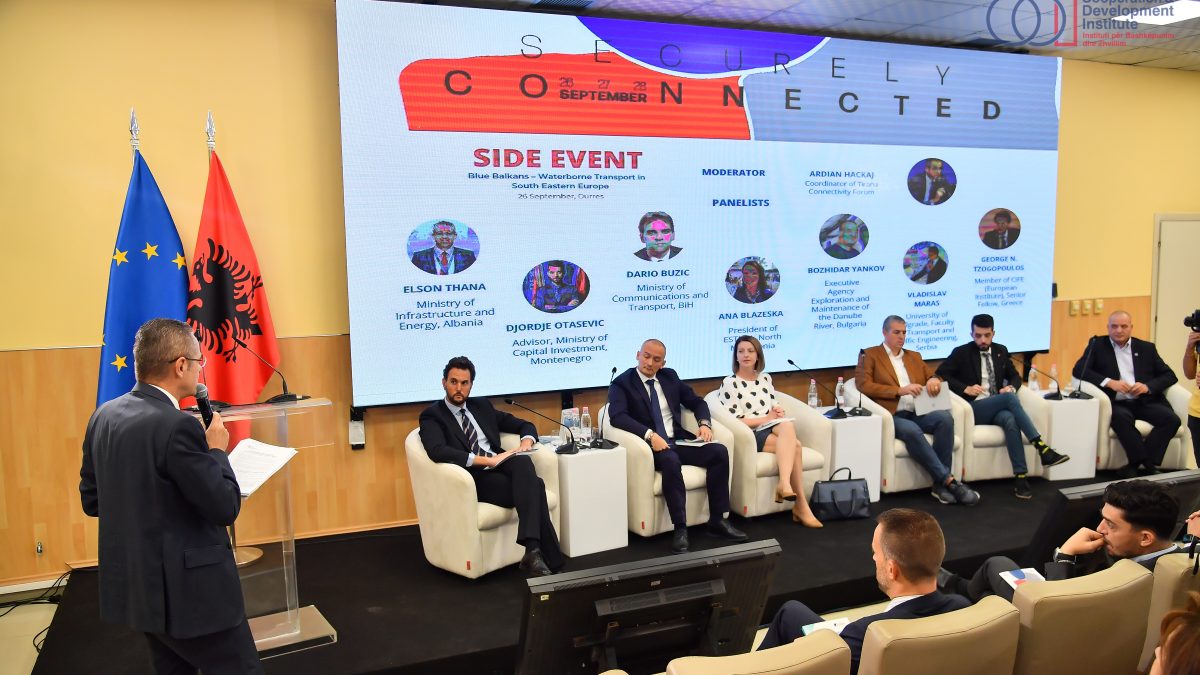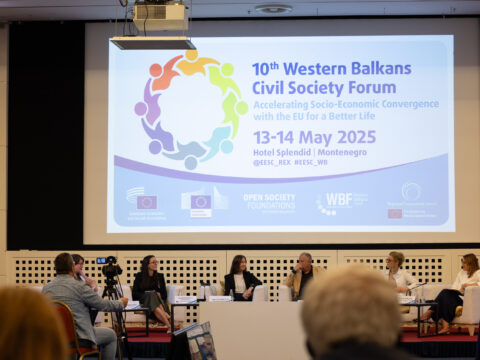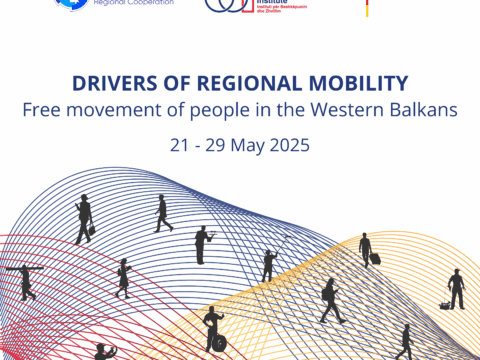29 September 2022
Tirana Connectivity Forum 2022, a yearly Forum organized by Cooperation and Development Institute, concluded its 8th edition. Themed “Securely Connected”, the three days forum held from 26-28th September, was composed of three blocks, one per each day.
Day 1, Secure and Resilient Infrastructure was focused on the East – West links of the new Western Balkans European Transport Corridor through waterborne transport (the Rhine – Danube corridor including Adriatic ports), and through rail (Corridor VIII connecting the Adriatic with Black Sea). TCF22 day 1 was coordinated with the Maritime Week 2022: “New technologies for a greener maritime transport” organized by Durres Port Authority; CEMA – Centre of Excellence in Maritime Affairs; the Cooperation and Development Institute; and Albanian Ministry of Infrastructure and Energy.
In this context, TCF22 kicked off with the Side Event “Blue Balkans – Waterborne Transport in South Eastern-Europe” organized in partnership with Konrad Adenauer Foundation and opened by Mr Pirro Vengu, Director of Durres Port Authority.
Distinguished professionals from SEE presented the findings of the paper “Blue Connectivity: Maritime and Inland Waterways in the Balkans Peninsula”, and then engaged in discussions with ports and waterways experts. The policy paper is the first of that kind and provides a comprehensive overview of waterborne nodes and links in South East Europe and assesses their advancement in fulfilling compliance indicators for ETC criteria. The debates further underlined the importance of ports as nodes for people and economies, as well as a detailed view of port infrastructure, governance, traffic, and TEN-T compliance indicators.
In the official opening, the Forum was greeted by the Ambassador of the Czech Republic in Tirana, HE Karel Urban, followed by a keynote address from the Ambassador of the EU in Albania, HE Christiane Hohmann. Ambassador Hohman pointed out how through the Berlin Process, EU and the WBs are implementing an ambitious connectivity agenda in the transport and energy sectors. She underlined three pre-conditions to be fulfilled in order to get the best from the infrastructure projects: i) make progress on Common Regional Market to reach an inclusive regional economic integration, ii) have future-proof investments that contribute to green transition, and iii) have ownership of major projects and the necessity to implement them in close consultation with local communities.
The “Panel 1: Criticality of the new Western Balkans European Transport Corridor – the East-West Dimension” TCF22 welcomed the railway managers from North Macedonia, Albania and Montenegro to discuss rail infrastructure developments in the East-West axis / Corridor VIII.
After a detailed presentation of the progress of rail infrastructure along Corridor 8 trace in North Macedonia, Mr Hari Lokvenec, Director of Public Enterprise for Railway Infrastructure Railways of Republic of North Macedonia pointed out the importance of opening the sector to young people as well as of transferring knowledge and expertise. Mr. Lokvenec expressed his institution’s commitment to invest in a Center for Railways Excellence and to work along with civil society and youth organizations in this project. In the same panel, Ms Marina Bošković Director of Railways Infrastructure of Montenegro and Mr Gentian Liko of Albanian Railways offered a comprehensive overview of the situation in their respective countries of rail infrastructure.
Closing the first day of TCF22, Panel 2: Planning for and Funding Resilient Infrastructure, Ms Jovana Marovic, Deputy Prime Minister and European Affairs Minister of Montenegro stated Montenegro’s commitment to the implementation of the priority infrastructure projects focusing mainly on transport and energy. In this account, she stressed the importance that civil society has in the project identification phase, on providing expertise and in monitoring infrastructure projects for a timely and qualitative implementation.
Following the discussion, Mr Ilir Beqaj, Director General of Albanian State Agency for Strategic Programming and Aid Coordination and National IPA Coordinator underlined the need to include resilience as an integral part of any feasibility study of infrastructure projects.
Deputy Prime Minister and National IPA Coordinator of North Macedonia, Mr Bojan Marickij highlighted the importance of regional coordination during the NSPP and especially when planning strategic infrastructure. During his intervention at TCF22, he outlined his proposal to gather all SEE6 NIPAC in Skopje at the earliest to coordinate the joint priorities and on a coordinated approach in the context of war in Ukraine. He also asked that SEE6 ministers in charge of energy participate in the EU Council Energy for a “When aligned totally with EU Foreign Policy vis-à-vis the war in Ukraine, SEE6 countries should also be part of the EU strategy regarding energy”, he said.
Closing the Panel 2, Mr Matteo Rivellini, Head of Division Western Balkans & Turkey, European Investment Bank Global officially declared that there will be no more financing of gas projects in the region from EIB Global.
The incisive professional debates followed by concrete proposals, policy developments and / or official declarations during the first day of TCF22, an initiative led by a civil society organization, provide tangible proof of the need of an all-inclusive approach to advancing convergence with the EU.
Have a look at the gallery here or watch DAY 1 here
The 8th edition of the TCF was supported by Hanns Seidel Foundation, Konrad Adenauer Foundation, Center of Excellence for Maritime Affairs, Heinrich Boell Foundation, Regional Cooperation Council and Tirana European Youth Capital 2022. TCF 2022 is part of the official calendar of the Czech Presidency and of the European Year of Youth.






